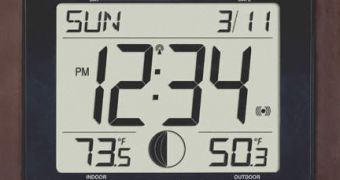We hope you've had a great year, because 2008 is just about to get longer. Not much longer – only by a second; a leap second. In this context, the phrase "Wait a moment, it's not 2009" could get a new meaning, if you get to say it very fast, and at the right time. The second will be added by December 31st at 23 hours, 59 minutes and 59 seconds Coordinated Universal Time (6:59:59 pm Eastern Standard Time) by an international consortium of timekeepers.
The leap second is aimed to synchronize the most precise of the timekeeping devices with the slowing rotation of our planet. It works the same way as the day that is added to the month of February every four years. This process is based on the fact that the Earth's rotation around the Sun takes 365.2422 days, which we round down at 365 for simplicity reasons, and prefer to add the rest every four years as a whole new day, for synchronization purposes.
Similarly, as the planet spins around its axis ever slower, sometimes a leap second has to be added. Since 1972, when a synchronization system was implemented, this is the fourth time a year has both a day and a second added to it (the last time, this happened in 1992). The International Earth Rotation and Reference Systems Service adds (or removes) leap seconds as necessary, depending on the monitored rotation velocity of the Earth, at intervals ranging from six months to seven years.
Atomic clocks have replaced the old way of determining seconds (based on the Earth's mean rotation in relation to certain celestial bodies) by a new system that deduces seconds from a signal emitted at regular intervals by the electrons that change their energy state within atoms. Atomic clocks are reliable timekeeping tools for systems that depend on it, like the Internet's Network Time Protocol or the Global Positioning System (GPS).
"We watch the clock and make sure nothing breaks," shared Geoff Chester, spokesman for the Washington-based Naval Observatory, as quoted by PhysOrg. "It's an early New Year's celebration," he added. They will have this celebration at 6:59:60 pm, local time.

 14 DAY TRIAL //
14 DAY TRIAL //